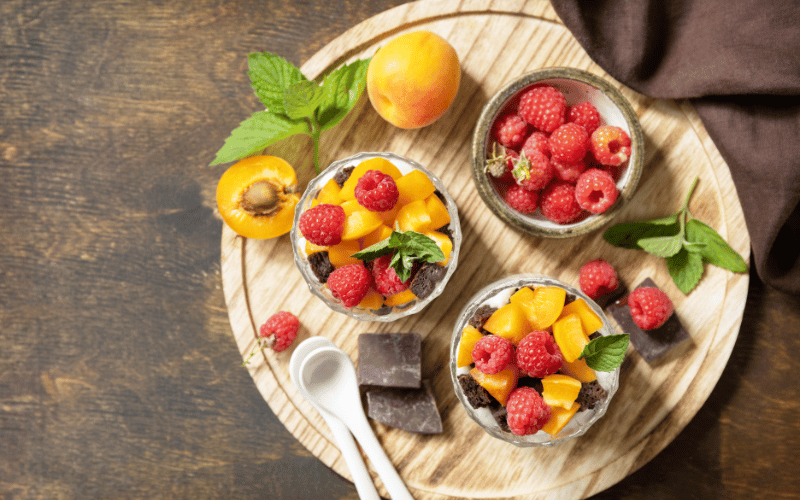In today’s fast-paced world, millennial women are constantly on the move, balancing careers, personal life, and often, family responsibilities. Amidst this hustle, maintaining a healthy diet becomes crucial, not just for physical well-being but also for mental health. This article sheds light on essential healthy foods specifically beneficial for millennial women, aiming to foster a balanced diet and vibrant health.
Healthy Foods: A Foundation for Millennial Women’s Health
Emphasizing the importance of nutrition, this section delves into why millennial women should prioritize healthy eating habits. It discusses the impact of nutrition on overall health, energy levels, and mood.
Nutrition Tips for a Balanced Diet
Here, readers will find practical advice on incorporating essential nutrients into their daily meals. This section serves as a guide to creating a balanced diet that supports health and well-being.
Superfoods for Energy and Vitality
Highlighting a variety of superfoods, this part explores foods rich in antioxidants, vitamins, and minerals. It suggests easy ways to include these power-packed foods in everyday meals.
Optimizing Mental Health Through Diet
Understanding the connection between diet and mental health is vital. This section discusses foods that enhance mood, reduce stress, and support cognitive function.
Hydration: The Underrated Nutrient
Hydration plays a critical role in maintaining health. This segment emphasizes the importance of water and other hydrating beverages, offering tips to ensure adequate daily intake.
Balancing Hormones with Nutrition
For many women, hormonal balance is a key concern. This part of the article focuses on foods that naturally support hormone regulation.
Weight Management and Healthy Eating
Addressing weight management, this section provides strategies for healthy eating that support weight loss or maintenance without compromising nutrition.
Building Strong Bones: Calcium-Rich Foods
Bone health is crucial for women of all ages. This segment identifies calcium-rich foods essential for building and maintaining strong bones.
Heart Health: Foods to Favor and Avoid

Heart disease is a leading concern for women. This part offers dietary tips for promoting heart health, including foods to favor and those to avoid.
Digestive Health and Gut-Friendly Foods
Gut health is fundamental to overall well-being. Here, readers will learn about probiotics, fiber-rich foods, and other gut-friendly dietary choices.
Skin Health from Within: Nutrition for Radiant Skin
Beautiful skin starts with nutrition. This section explores foods that support skin health, leading to a natural glow.
Sustainable Eating for Personal and Planetary Health
Sustainability in food choices not only benefits personal health but also the planet. This part encourages environmentally friendly eating habits.
Meal Planning Tips for Busy Millennial Women
Meal planning can save time and ensure a healthy diet. This section offers practical tips for busy schedules.
Smart Snacking: Healthy Options for On-the-Go

Snacking can be healthy if done right. Here, the focus is on nutritious snack options that are perfect for millennial women on the move.
Eating Out: Navigating Menus for Healthier Choices
Eating out doesn’t have to derail a healthy diet. This part provides strategies for making healthier choices at restaurants.
The Role of Supplements in a Balanced Diet
While whole foods are ideal, supplements can play a role in a balanced diet. This section discusses when and how to incorporate supplements effectively.
The Impact of Stress on Eating Habits
Stress can significantly affect eating habits. This segment explores ways to manage stress and maintain healthy eating patterns.
Physical Activity and Nutrition: A Synergistic Relationship
Nutrition and physical activity go hand in hand. This part highlights the importance of a balanced approach to health and fitness.
Mindful Eating: Connecting with Your Food
Mindful eating can transform one’s relationship with food. This section introduces the concept and benefits of mindfulness in eating habits.
The Sugar Trap: Reducing Added Sugars in Your Diet

Added sugars are a concern for many. This part offers advice on reducing sugar intake for better health.
The Power of Protein: Sources and Benefits
Protein is essential for health and vitality. This section identifies high-quality protein sources and their benefits.
Fats: The Good, The Bad, and The Essential
Fats are often misunderstood. Here, the article clarifies the types of fats and their roles in a healthy diet.
Carbohydrates: Choosing Wisely for Energy and Health
Carbohydrates are crucial for energy. This segment discusses how to choose healthy carbs that support well-being.
Conclusion: Embracing a Healthy Lifestyle
Summarizing the importance of healthy eating for millennial women, this conclusion encourages readers to embrace a balanced diet and lifestyle for long-term health and happiness.
FAQs
What are the best superfoods for millennial women?
Millennial women should consider incorporating superfoods that are not only nutrient-dense but also versatile and easy to integrate into their busy lifestyles. Some of the best options include:
- Berries: Rich in antioxidants, vitamins, and fiber.
- Leafy Greens: Such as kale, spinach, and Swiss chard, which are high in vitamins A, C, E, and K.
- Nuts and Seeds: Especially flaxseeds, chia seeds, and almonds, which are good sources of omega-3 fatty acids and fiber.
- Quinoa and Oats: Whole grains that provide a good source of protein and fiber.
- Avocado: High in healthy fats, fiber, and vitamins C, E, K, and B-6.
- Legumes: Like lentils and chickpeas, which are excellent sources of plant-based protein and fiber.
How does diet impact mental health?
Diet plays a crucial role in mental health. Nutrient-dense foods like whole grains, lean protein, fruits, and vegetables can enhance brain function and energy levels, leading to improved mood and cognitive function. Omega-3 fatty acids, found in fatty fish and flaxseeds, are particularly beneficial for brain health. Conversely, diets high in refined sugars and processed foods may contribute to mood swings, anxiety, and depression.
Can nutrition help with hormonal balance?
Yes, nutrition can significantly influence hormonal balance. Foods rich in omega-3 fatty acids, such as salmon and walnuts, can help reduce inflammation and support hormonal health. Fiber-rich foods, like fruits, vegetables, and whole grains, aid in digestion and the elimination of excess hormones. Additionally, incorporating foods high in antioxidants and phytoestrogens (e.g., berries, green tea, and flaxseeds) can help in maintaining a healthy hormonal balance.
What are some quick, healthy meal ideas for busy days?
For busy days, opt for meals that are easy to prepare and nutrient-rich:
- Smoothies: Blend leafy greens, a handful of berries, a banana, and a scoop of protein powder for a quick, nutritious meal.
- Salad Jars: Layer salad ingredients in a jar, starting with dressing, hard veggies, beans, grains, and leafy greens on top. Shake when ready to eat.
- Overnight Oats: Mix oats with milk or a dairy-free alternative, chia seeds, and your favorite fruits. Let sit overnight in the fridge.
- Wraps: Use whole-grain wraps filled with lean protein (like turkey or chicken), lots of vegetables, and hummus or avocado for healthy fats.
How can I make healthy eating more affordable?
- Buy in Bulk: Purchase whole grains, nuts, seeds, and legumes in bulk.
- Seasonal Produce: Opt for fruits and vegetables that are in season to get the best prices and flavors.
- Plan Meals: Meal planning can reduce impulse buys and food waste.
- Grow Your Own: Even a small herb garden can save money on fresh herbs.
What strategies can help me make healthier choices when eating out?
- Start with a Salad: Beginning your meal with a salad can help fill you up with fiber and reduce the likelihood of overeating.
- Choose Grilled Over Fried: Opt for foods that are grilled, steamed, or baked rather than fried.
- Watch Portion Sizes: Consider splitting entrees or taking half to go to keep portion sizes in check.
- Mind the Add-ons: Request dressings and sauces on the side to control the amount you use.
Suggested Links:
- ChooseMyPlate.gov for dietary guidelines
- Environmental Working Group for information on sustainable eating practices

